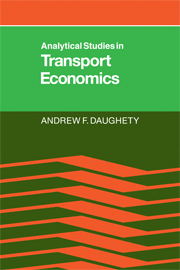Book contents
- Frontmatter
- Contents
- Contributors
- Preface
- INTRODUCTION
- TECHNOLOGY AND DEMAND
- 2 Augmentation effects and technical change in the regulated trucking industry, 1974–1979
- 3 An econometric analysis of the cost and production structure of the trucking industry
- 4 Network effects and the measurement of returns to scale and density for U.S. railroads
- 5 Using indexed quadratic cost functions to model network technologies
- 6 Joint estimation of freight transportation decisions under nonrandom sampling
- EQUILIBRIUM, PRICING, AND MARKET BEHAVIOR
- Index
3 - An econometric analysis of the cost and production structure of the trucking industry
Published online by Cambridge University Press: 07 October 2011
- Frontmatter
- Contents
- Contributors
- Preface
- INTRODUCTION
- TECHNOLOGY AND DEMAND
- 2 Augmentation effects and technical change in the regulated trucking industry, 1974–1979
- 3 An econometric analysis of the cost and production structure of the trucking industry
- 4 Network effects and the measurement of returns to scale and density for U.S. railroads
- 5 Using indexed quadratic cost functions to model network technologies
- 6 Joint estimation of freight transportation decisions under nonrandom sampling
- EQUILIBRIUM, PRICING, AND MARKET BEHAVIOR
- Index
Summary
An understanding of the structure of technology and the cost-generation process is a necessary step in the analysis of many policy issues. Questions of regulation, deregulation, merger, pricing, and investment all require extensive information on the affected firms' cost and production functions. The recent explosion of interest in issues of deregulation of transportation industries has generated a number of cost analyses of railroads, airlines, and, most recently, motor carriers. The purpose of this chapter is to help further sharpen the emerging image that studies of the motor carrier industry are providing. Our approach will involve emphasizing the heterogeneity of motor carrier technology, the source of the heterogeneity being the spatial context (or environment) within which production takes place. Our main goal is to find a unified and convenient characterization of the subtechnologies, with special emphasis on the role of the spatial environment in generating the subtechnologies.
We proceed as follows. We first pose a family of technologies indexed by a vector of attributes reflecting spatial and market characteristics. We shall see that one way to think of this vector is as a vector of lumpy inputs, some of which may or may not have meaningful notions of markets in which to purchase the lumpy inputs. We then proceed to consider the attribute-indexed cost function dual to the family of technologies.
- Type
- Chapter
- Information
- Analytical Studies in Transport Economics , pp. 65 - 96Publisher: Cambridge University PressPrint publication year: 1986
- 1
- Cited by



